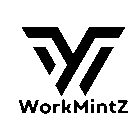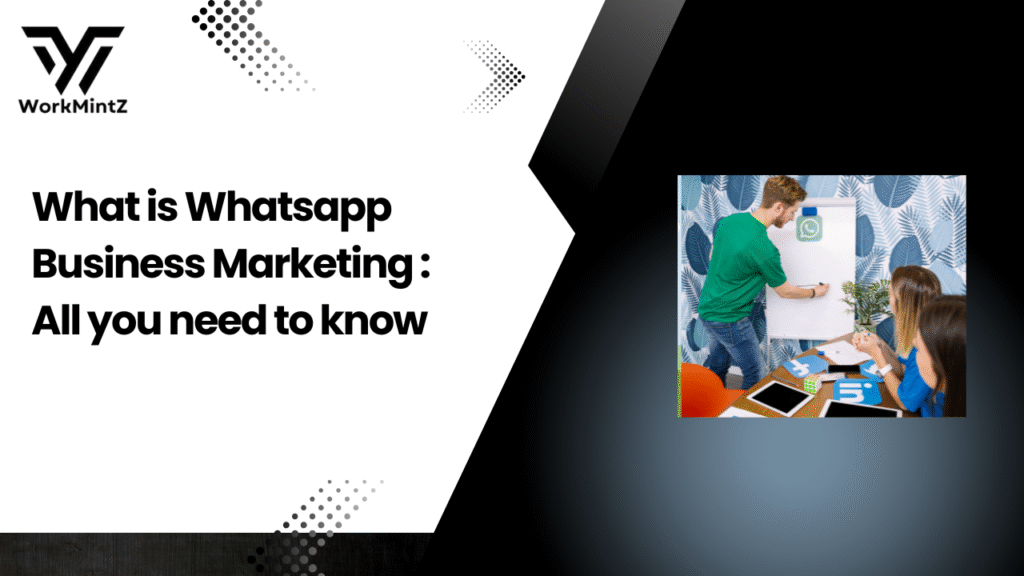Table of Contents
ToggleWhat is Whatsapp Business Marketing : All you need to know- 2025
In today’s fast-paced digital world, direct and personal communication has become essential for businesses to connect with their audience. That’s where WhatsApp Business marketing comes in — a powerful, personalized way for businesses to interact with customers in real time. Whether you’re a startup or an established brand, understanding WhatsApp marketing meaning and how it works can give your business a significant edge.
WhatsApp Business allows you to set up a dedicated business profile, send automated replies, use the WhatsApp catalogue, and broadcast messages — all designed to enhance customer engagement on WhatsApp. It’s more than just messaging; it’s about creating value, trust, and convenience. At Workmintz, we’ve seen how WhatsApp Business tools can increase conversions, improve customer communication on WhatsApp, and simplify daily operations.
From setting up your WhatsApp Business account to using advanced WhatsApp marketing tools like chatbots and broadcast lists, this ultimate guide walks you through everything. We’ll also explore WhatsApp marketing benefits, WhatsApp spam policy, marketing ethics, and successful WhatsApp campaign examples. Get ready to discover how WhatsApp Business can transform your direct marketing approach in 2025 and beyond.
1. What Is WhatsApp Business Marketing?
The intentional implementation of WhatsApp’s trained business platform in order to attract, communicate, and convert users is recognized as WhatsApp business marketing. Unlike regular WhatsApp, the Business version offers exclusive tools like quick replies, automated messages, labels, and a product catalogue. These features are specifically designed to support business operations and customer communication on WhatsApp in a structured and scalable way.
The directness of WhatsApp marketing is part of what makes the service valuable. You’re entering a customer’s personal space — their inbox — which is more impactful than any email or ad. Using tools like WhatsApp Business API explained in detail, brands like Workmintz personalize campaigns, automate customer service, and manage queries efficiently.
At its core, WhatsApp Business introduction includes creating a complete business profile, uploading your WhatsApp catalogue, and setting up automated replies and greeting messages. WhatsApp broadcast messages allow businesses to send announcements and offers to multiple users at once, while the ability to label customers in WhatsApp helps with CRM and segmentation.
:- WhatsApp Business marketing offers rapid and effective connection in a time whenever the attention spans of individuals are growing shorter. It’s direct marketing via WhatsApp — and when done ethically, by following WhatsApp spam policy and marketing rules, it becomes a high-converting channel that boosts brand trust and loyalty.
2. Benefits of Using WhatsApp for Business
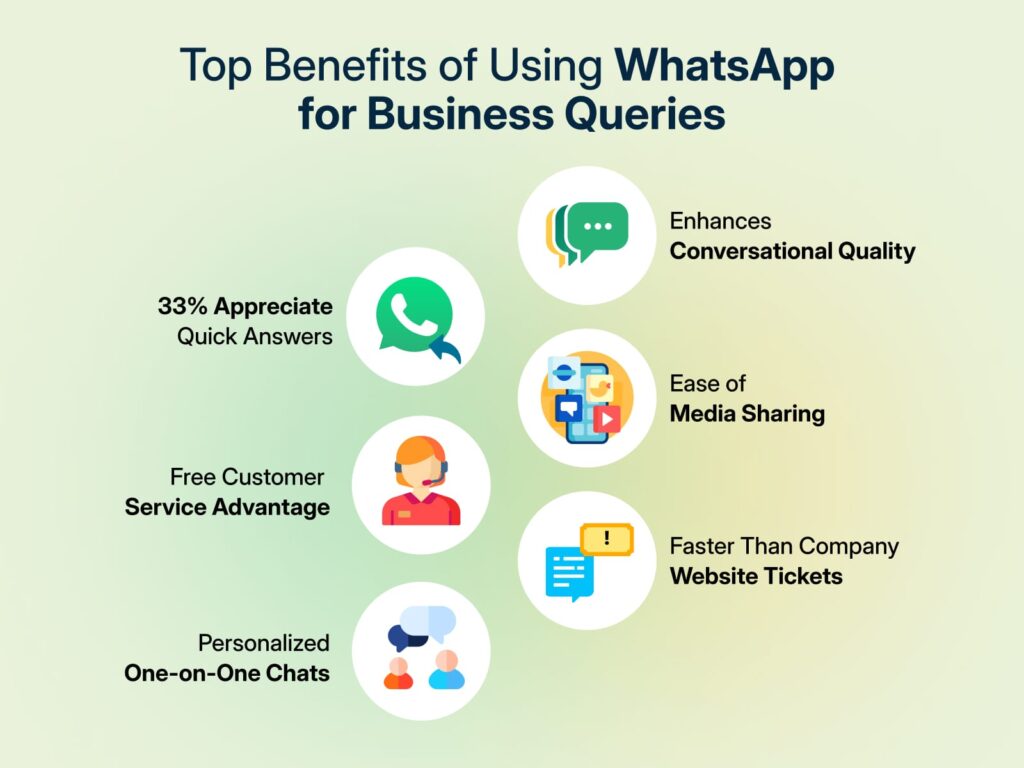
WhatsApp Business offers a wide range of advantages that go beyond traditional marketing channels. Real-time client engagement on WhatsApp is one of the biggest advantages of WhatsApp marketing. Whether it’s order updates, product inquiries, or service requests, customers appreciate fast, direct responses — and WhatsApp delivers just that.
Increased brand understanding and confidence represent two additional perks. With a verified WhatsApp Business account, your customers can see your business name, logo, and key details, which builds authenticity and makes communication feel personal. At Workmintz, we’ve noticed that using WhatsApp marketing tools like automated replies, the WhatsApp catalogue, and broadcast messages drastically improves customer satisfaction and conversion rates.
Additionally, the WhatsApp catalogue feature acts like a mini-storefront, allowing businesses to showcase their products or services directly in the chat. This encourages browsing and purchasing within the app itself. With the ability to label customers in WhatsApp, businesses can segment and retarget audiences efficiently, improving ROI.
From small startups to large enterprises, advanced WhatsApp marketing strategies — such as using chatbots on WhatsApp or integrating WhatsApp Business API — help streamline operations while keeping customer communication seamless and personal. For businesses looking for high engagement and conversion, WhatsApp is not just an option — it’s a necessity in 2025
3. How to Set Up a WhatsApp Business Profile
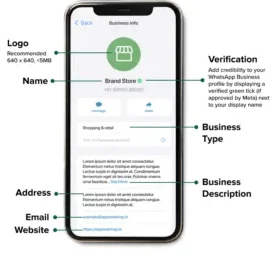
Setting up a WhatsApp Business profile is the first step toward launching a successful WhatsApp marketing strategy. This simple process allows you to establish a professional presence and build trust with your audience. A proper WhatsApp Business account setup ensures customers can easily recognize and interact with your brand, which is essential for maintaining credibility and maximizing customer engagement on WhatsApp.
To begin, download the WhatsApp Business app from the Play Store or App Store. After installing, verify your business phone number — preferably a dedicated one for professional use. Once verified, it’s time to create your WhatsApp Business profile. This includes adding your business name, logo, category, location, hours of operation, email, website, and a short description of what your business offers.
Workmintz recommends paying close attention to your business description. It should clearly explain your services and include relevant keywords like “WhatsApp marketing benefits” or “direct marketing WhatsApp” to enhance discoverability.
Once your profile is complete, explore WhatsApp Business tools like labels, quick replies, and greeting messages to enhance user experience. Proper setup not only boosts professionalism but also improves engagement rates. Take in consideration that your WhatsApp Professional profile is also an internet showroom, so make the best use of it.
4. Top Features of WhatsApp Business You Should Use and Integrating WhatsApp With Your Overall Marketing Strategy
WhatsApp Business marketing delivers quick and efficient interacting in a time where attention spans become smaller. Utilizing these WhatsApp Business tools strategically can streamline your marketing operations while building stronger connections with your audience At Workmintz, we believe that the fundamental component of intelligent WhatsApp marketing is growing adept with these kinds of devices.
One standout feature is the WhatsApp catalogue, which lets businesses showcase products or services directly in the app — acting like a mini-storefront. It’s ideal for businesses that want to drive inquiries without redirecting users to external websites. Another essential tool is automated replies, including greeting messages, away messages, and quick replies on WhatsApp, all of which ensure you’re communicating with customers even when offline.
Labels allow you to label customers in WhatsApp for better organization, helping segment leads, new customers, and loyal buyers. Broadcast lists make it possible to send WhatsApp broadcast messages to multiple contacts at once — perfect for promotions and announcements.
The chatbot on WhatsApp and WhatsApp Business API explained are critical for scaling conversations and integrating your CRM. These tools transform WhatsApp into a powerful marketing engine that supports direct marketing via WhatsApp, ultimately driving conversions.
A common mistake brands make is treating WhatsApp Business as a standalone tool. In reality, WhatsApp marketing becomes exponentially more powerful when integrated with your broader digital marketing ecosystem. It should complement your email marketing, social media, CRM, and website — not compete with them.
For instance, you can run click-to-WhatsApp ads on Facebook and Instagram, which allow users to directly initiate a chat with your business. This eliminates friction and capitalizes on impulse buying behavior. At Workmintz, we’ve integrated WhatsApp lead capture into paid social campaigns to improve conversion rates by over 30%.
You can also integrate WhatsApp into your website through chat widgets. If someone browses a product page for over 30 seconds, a WhatsApp prompt can appear asking if they have any questions. This proactive customer communication on WhatsApp adds a human touch to online browsing and leads to better conversions.
CRM integration is another powerful use case. By linking your WhatsApp Business API to platforms like HubSpot or Salesforce, you can automate follow-ups based on lead score, purchase history, or browsing behavior. This ensures every message is timely and relevant.
For email marketing, WhatsApp acts as a faster, more personal follow-up channel. If a user doesn’t open an important email within 48 hours, a WhatsApp message can remind them or offer additional value. This kind of omnichannel orchestration turns WhatsApp into a bridge between platforms, not a silo.
The goal is to build a unified communication strategy where WhatsApp plays a central role — from first touchpoint to loyalty nurturing. Workmintz helps businesses create this alignment so that messaging is not only consistent across channels but also optimized for every customer touchpoint.
5. How to Use Broadcast Lists and Labels Effectively
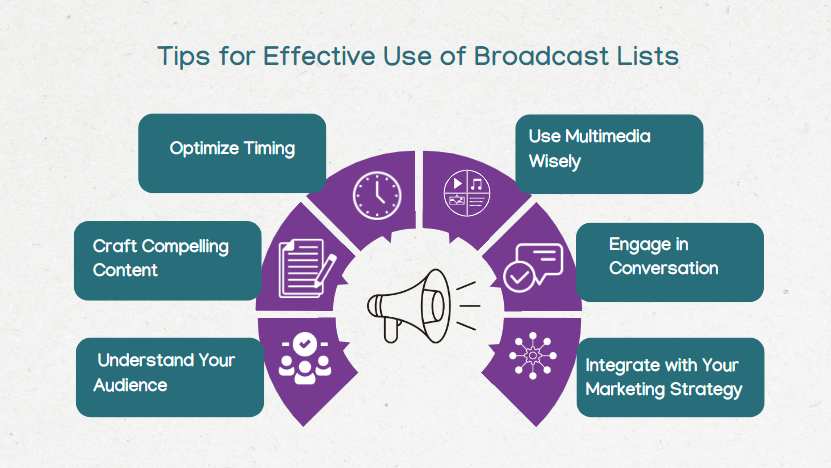
Broadcast Lists and Labels are two powerful features within WhatsApp Business that can supercharge customer engagement on WhatsApp when used strategically. These tools help businesses personalize communication, stay organized, and deliver targeted messaging without spamming users. At Workmintz, we always recommend businesses to fully leverage these features as part of their WhatsApp Business marketing strategy.
Broadcast Lists allow you to send WhatsApp broadcast messages to multiple contacts simultaneously — without creating a group. This means your message lands in each customer’s private chat, preserving personalization and privacy. It’s ideal for promotions, updates, and festive offers. To use this effectively, segment your contacts based on purchase behaviour, interests, or interaction history. This ensures relevance and boosts open rates.
On the other hand, labels in WhatsApp help categorize and manage chats. You can label leads as “New Lead,” “Pending Payment,” “Loyal Customer,” or custom tags. When combined with automated replies and quick replies on WhatsApp, it creates a seamless flow of communication and improves internal coordination.
These tools are not just for organization—they’re a key part of advanced WhatsApp marketing and customer lifecycle management. Together, they help build stronger relationships and deliver more meaningful interactions through direct marketing on WhatsApp.
6. Do’s and Don’ts of WhatsApp Business Marketing
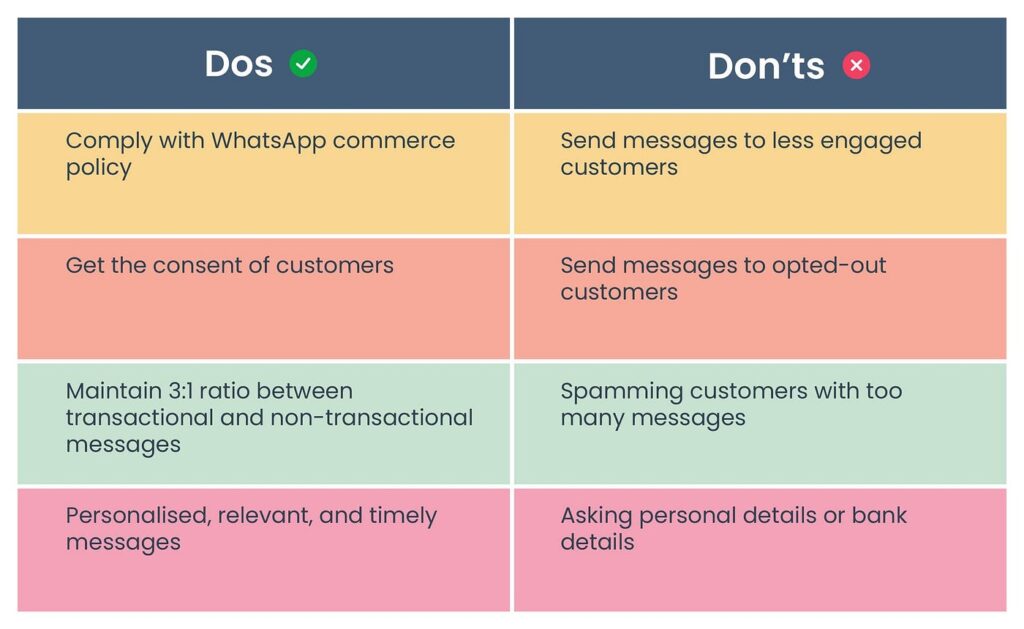
Effective WhatsApp Business marketing isn’t just about sending messages — it’s about building trust, respecting user privacy, and maintaining professional communication. At Workmintz, we stress the importance of using WhatsApp ethically and smartly to maximize customer communication on WhatsApp. Here are the essential do’s and don’ts every business must follow.
Do’s:
- ✅ Set up a verified WhatsApp Business account with a complete profile including your logo, business description, and catalogue. This helps users trust your brand.
- ✅ Use automated replies and quick replies on WhatsApp to respond instantly to FAQs or off-hour queries.
- ✅ Segment your audience with labels in WhatsApp and send broadcast messages only to users who’ve opted in.
- ✅ Leverage the WhatsApp catalogue feature to showcase products and streamline the shopping experience.
- ✅ Monitor customer engagement on WhatsApp using metrics like open rate, response rate, and click-throughs.
Don’ts:
- ❌ Don’t spam. Understand the WhatsApp spam policy — repeated unwanted messages can get your number banned.
- ❌ Avoid sending bulk messages without user consent. This violates marketing ethics and user trust.
- ❌ Never misuse the WhatsApp Business API — use it to automate workflows, not to spam customers.
7. Common Mistakes to Avoid in WhatsApp Business Marketing and Leveraging WhatsApp Across the Customer Lifecycle
- While WhatsApp Business marketing offers tremendous potential, many brands fall into common traps that hinder performance and hurt brand credibility. At Workmintz, we guide businesses to avoid these pitfalls and ensure they’re using the platform in a way that drives genuine results and follows the best practices outlined in marketing ethics.
- One major mistake is failing to set up a proper WhatsApp Business profile. A profile without a display picture, business description, or catalogue appears unprofessional and untrustworthy. Similarly, businesses often ignore the power of automated replies and quick replies on WhatsApp, which leads to poor customer communication on WhatsApp and longer response times.
- Another critical misstep is using broadcast messages Sending messages to users who haven’t opted in violates the WhatsApp spam policy, risks getting your account banned, and damages your brand’s reputation. Also, many businesses overlook WhatsApp Business tools such as labels, catalogues, and WhatsApp campaign examples that could simplify customer segmentation and content delivery.
- Lastly, ignoring WhatsApp marketing rules and not measuring performance with case studies or analytics tools prevents data-driven decision-making. Avoiding these mistakes can help you build stronger customer connections and get the most out of your WhatsApp Business marketing
- To fully harness the potential of WhatsApp Business marketing, brands must understand how to map their communication strategy across the customer journey — from awareness to loyalty. WhatsApp isn’t just a channel for sending updates; it’s a two-way communication tool that allows brands to nurture relationships and drive conversions at every stage.
- In the awareness stage, WhatsApp can be used to welcome new users with greeting messages and educational content. Using automated replies, you can provide quick access to brand information or FAQs, setting the tone for a helpful experience. Workmintz recommends including clickable catalog links and rich media in these initial interactions to increase engagement.
- During the consideration and decision-making stages, WhatsApp’s product catalogue feature becomes particularly powerful. It enables brands to share product images, prices, and descriptions within the chat — making the buying experience seamless. When paired with quick replies on WhatsApp and human agents, this creates a hybrid model of automation and personal support.
- In the post-purchase phase, businesses can use WhatsApp broadcast messages for order confirmations, shipping updates, and satisfaction surveys. Segmenting users with labels in WhatsApp allows for highly targeted retention campaigns, including loyalty rewards or cross-sell opportunities.
- Advanced WhatsApp marketing tools like chatbots and the WhatsApp Business API can also trigger specific flows based on user behavior. For example, if a user abandons a cart, a friendly follow-up with a discount offer can be automatically sent. At Workmintz, we’ve seen this lifecycle-focused approach drive repeat purchases, reduce churn, and improve customer satisfaction metrics significantly.
8. Advanced Strategies for WhatsApp Business Marketing
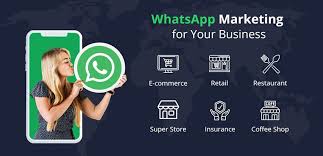
Once you’ve mastered the basics of WhatsApp Business marketing, it’s time to level up with advanced strategies that can significantly boost engagement, conversions, and brand loyalty. At Workmintz, we believe that utilizing advanced tools and automation is the key to unlocking WhatsApp’s full potential as a direct marketing channel.
- Using the WhatsApp Business API is one of the most successful approaches.. Unlike the standard app, the API allows for seamless integration with CRM systems, marketing platforms, and chatbot on WhatsApp, enabling businesses to automate large-scale communication while maintaining personalization. This is essential for businesses managing hundreds or thousands of conversations simultaneously.
- Another high-impact tactic is to use interactive content like WhatsApp catalogues with product images, prices, and direct ordering options. This increases product visibility and makes it easier for customers to make purchasing decisions. Implementing automated replies with smart branching logic can also guide users based on their intent — whether they’re inquiring about products, seeking support, or ready to purchase.
- You can also create segmented broadcast lists, use labels in WhatsApp Business to categorize users by interest or funnel stage, and run targeted WhatsApp campaign examples based on behaviour data.
- These advanced WhatsApp Business strategies position your brand, like Workmintz, as a modern, responsive, and customer-first business ready to scale.
9. Case Studies & Campaign Examples of WhatsApp Business Marketing
- To truly understand the power of WhatsApp Business marketing, it’s helpful to look at real-world case studies and WhatsApp campaign examples. These success stories highlight how brands have leveraged WhatsApp to drive customer engagement, streamline communication, and increase conversions — all of which are central to the services we provide at Workmintz.
- For instance, a popular fashion brand used the WhatsApp catalogue feature to display its seasonal collection. By combining rich media messages with automated replies, they achieved a 60% boost in product inquiries and a 40% uplift in sales. Another company, a travel agency, implemented a chatbot on WhatsApp to manage bookings, answer FAQs, and send timely trip reminders. As a result, their customer response time dropped significantly, and overall customer satisfaction improved.
- In another case, an education consultancy used WhatsApp broadcast messages to notify students about deadlines, updates, and events. Using features like quick replies on WhatsApp and label customers in WhatsApp, they were able to manage leads more effectively and saw a 50% increase in enrollment conversions.
. These WhatsApp Business case studies clearly show how brands, with support from digital marketing experts like Workmintz, can maximize impact using strategic and ethical direct communication tools on WhatsApp
Conclusion: The Future and Future Trends of WhatsApp Business Marketing
- As we move deeper into the digital era, WhatsApp Business Marketing is emerging as a game-changer for brands looking to build strong, personalized customer relationships. With over 2 billion active users globally, WhatsApp provides an unmatched platform for direct communication. For small businesses and large enterprises alike, leveraging features like the WhatsApp catalogue, automated replies, broadcast messages, and the WhatsApp Business API offers not only greater customer engagement on WhatsApp but also improved sales and customer retention.
- Platforms like Workmintz are empowering businesses to use WhatsApp Business tools ethically and strategically. By understanding WhatsApp marketing rules, following the WhatsApp spam policy, and incorporating marketing ethics, brands can create impactful campaigns without compromising trust. The rise of advanced WhatsApp marketing tactics, including chatbots, automated workflows, and real-time updates, is making it easier than ever to reach and retain customers.
- As digital marketing trends continue to evolve, businesses that master WhatsApp Business marketing will stand out in 2025 and beyond. Whether you’re just starting or scaling your strategy, now is the time to build your presence on WhatsApp. Let Workmintz be your trusted partner in creating meaningful customer connections through the power of conversational marketing.
- The evolution of WhatsApp Business is happening rapidly, with new features, policies, and user behaviors shaping how brands can communicate. Staying ahead of these trends will ensure your business remains competitive and compliant.
- One of the biggest shifts is the rise of conversational commerce. Instead of browsing static websites, customers now expect to discover, inquire, and purchase — all within a single WhatsApp chat. WhatsApp’s planned support for payment integration will soon allow users to complete transactions without leaving the platform. Workmintz is already preparing clients for this shift by building purchase-ready catalogues and refining sales scripts within chat.
- AI-powered chatbots on WhatsApp will also grow more intelligent. They won’t just answer FAQs — they’ll predict what a customer needs next based on data patterns. When paired with CRM insights, these bots will offer hyper-personalized product suggestions, appointment bookings, or upsell recommendations.
- We’re also seeing WhatsApp being used more for community building. Instead of generic mass messaging, businesses are creating micro-groups of VIP customers or interest-based segments and nurturing those relationships with exclusive offers, feedback requests, and behind-the-scenes content.
- Privacy and compliance are also taking center stage. WhatsApp’s spam policy is being enforced more strictly, and marketing ethics are no longer optional. Customers demand transparency, consent, and value in every message. Brands that focus on opt-in strategies and deliver genuinely helpful content will thrive.
- Finally, the growing use of analytics within WhatsApp Business is helping companies make data-driven decisions. By tracking open rates, response times, and click-throughs, brands can optimize content, timing, and audience segmentation for better performance. Workmintz encourages all clients to treat WhatsApp not just as a messaging tool — but as a performance-driven marketing channel.
Frequently Asked Questions
WhatsApp Business Marketing refers to using the WhatsApp Business app or API to engage, support, and sell to customers through direct messaging. It enables brands to build relationships through personalized, real-time conversations. Unlike traditional email or SMS marketing, WhatsApp marketing allows businesses to send product updates, promotions, transactional alerts, and customer service messages—all within a single platform. With over 2 billion global users, WhatsApp offers massive reach and high open rates.
Marketers can use features like labels, automated greetings, quick replies, and broadcast lists to streamline campaigns. WhatsApp Business also supports multimedia formats, making marketing more interactive. When used ethically and compliantly, it becomes a powerful tool to improve engagement and drive conversions—especially in regions where WhatsApp is a primary communication tool.
WhatsApp Business is designed specifically for small and medium businesses, while the regular WhatsApp app is for personal use. With WhatsApp Business, companies get features like a business profile (with hours, location, and website), product catalogs, greeting messages, away messages, and automation tools such as quick replies.
The app helps manage customer interactions more efficiently, offering structure and scalability that the standard version lacks. Businesses can also label chats for better CRM and use broadcast messaging to reach multiple customers at once. For larger companies, WhatsApp Business API provides advanced automation and integration capabilities.
In short, while regular WhatsApp is for chatting with friends and family, WhatsApp Business is a marketing, communication, and customer service tool. It improves brand credibility and offers a more professional experience to potential and existing customers.
WhatsApp Business Marketing offers numerous benefits, especially for businesses looking to build strong customer relationships. One major advantage is the direct, personal communication it enables. Messages on WhatsApp have high open rates, often above 90%, making it a highly effective marketing channel.
With tools like automated responses, quick replies, and message scheduling, businesses can maintain responsiveness even outside working hours. The platform also supports multimedia formats—images, videos, documents—allowing marketers to showcase products or services creatively.
Other benefits include improved customer support, real-time engagement, brand trust through verified business profiles, and cost-effectiveness compared to other channels. WhatsApp is encrypted and secure, which also boosts user confidence. For any business looking to humanize its marketing and connect meaningfully with audiences, WhatsApp Business is a powerful and scalable solution.
Yes, the WhatsApp Business mobile app is free to download and use, making it accessible for startups and small businesses. However, its features are limited to manual operations, which can become inefficient as the customer base grows. The WhatsApp Business API, on the other hand, is a paid service designed for medium and large businesses needing advanced automation, CRM integration, and bulk messaging capabilities.
While the API isn’t free, it’s priced based on conversation-based charges (user-initiated vs. business-initiated). Businesses often integrate it through official BSPs (Business Solution Providers), which may have separate fees.
Ultimately, while there’s a free version of WhatsApp Business, the most scalable and automated marketing comes through the paid API version. It’s important to evaluate your needs and customer volume to choose the most cost-effective option.
Businesses using WhatsApp Business can send a variety of message types to engage users effectively. These include promotional messages, transactional updates, order confirmations, delivery notifications, event reminders, product recommendations, and customer support replies.
With WhatsApp Business API, companies can also send template messages approved by WhatsApp, which are structured and used for notifications. WhatsApp’s multimedia support allows brands to send images, videos, PDFs, voice notes, and clickable CTA buttons for more interactive campaigns.
There’s a clear distinction between user-initiated and business-initiated conversations. Marketing messages must be pre-approved and adhere to WhatsApp’s business policies. Spammy behavior or non-consensual messaging can lead to bans. The key to success is personalization, timely delivery, and offering real value in every message.
WhatsApp Business enables real-time, two-way communication, which naturally enhances customer engagement. Unlike emails that may go unread or delayed, WhatsApp messages are typically read within minutes. Features like quick replies, FAQs, product catalogs, and automated responses help businesses respond faster, improving the user experience.
Through broadcast lists, you can send updates to multiple users who’ve opted in—ideal for campaigns, flash sales, or reminders. The personal nature of the platform makes users feel more connected and heard. Moreover, with the WhatsApp API, you can integrate chatbot flows and CRM systems to engage users around the clock.
At its core, WhatsApp Business nurtures engagement by making interactions seamless, conversational, and accessible across devices. This helps increase brand loyalty, repeat purchases, and positive word-of-mouth referrals.
The WhatsApp Business API is a robust communication solution designed for medium to large enterprises that need to automate and scale their customer messaging. Unlike the mobile app, which is ideal for small businesses, the API allows for full integration with CRMs, marketing automation platforms, and third-party applications.
It supports bulk messaging, chatbot integration, and conversation-based billing. With the API, businesses can handle thousands of customer conversations simultaneously and set up automated, personalized message flows. It also enables customer support teams to collaborate using shared inboxes.
This version requires approval from WhatsApp and is typically accessed via a Business Solution Provider (BSP). For businesses with high-volume communication needs or those wanting to build a highly interactive sales and support funnel, WhatsApp API is the best choice.
Yes, WhatsApp Business is considered secure for handling customer communications. All messages on WhatsApp—both personal and business—are end-to-end encrypted, meaning only the sender and recipient can read them.
For API users, data is encrypted during transit, and businesses must comply with WhatsApp’s data protection policies. The platform does not allow unauthorized third-party access to message content. To build even more trust, businesses can apply for the green checkmark (verified badge), showing users the account is legitimate.
However, businesses must also practice ethical data handling by obtaining opt-in consent, avoiding spam, and following regional data privacy laws (like GDPR or India’s DPDP). At Workmintz, we implement strict data compliance and recommend all users follow best practices to keep WhatsApp a safe and trusted channel for communication.
Getting user opt-ins is a critical requirement for WhatsApp Business Marketing. Businesses cannot legally or ethically message users unless they’ve provided explicit consent. Common ways to gain opt-ins include:
Adding opt-in checkboxes on website forms
Using click-to-chat ads on Facebook or Instagram
Promoting opt-ins via email or SMS campaigns
Including QR codes in physical stores or receipts
Offering incentives like discounts for subscribers
To stay compliant, clearly inform users what type of messages they will receive (e.g., order updates, promotions, tips). WhatsApp requires businesses to maintain these opt-in records in case of audits.
At Workmintz, we help brands design opt-in funnels that follow WhatsApp policies while increasing subscription rates—ensuring every contact is valuable and engaged.
To succeed with WhatsApp Business Marketing in 2025, businesses should follow these best practices:
Get consent before messaging.
Use personalized messages to boost engagement.
Stick to approved message templates for business-initiated chats.
Avoid spam and respect message frequency.
Respond quickly—within 24 hours for user-initiated messages.
Use rich media (images, videos, buttons) to enhance messaging.
Integrate chatbots and CRM tools for scale and automation.
Track performance using built-in or external analytics.
Maintain tone consistency to reflect your brand.
Ensure data security and comply with privacy laws.
At Workmintz, we ensure these practices are embedded into every campaign, maximizing reach while respecting user experience. Ethical, compliant, and personalized messaging is the key to thriving on WhatsApp in 2025.
